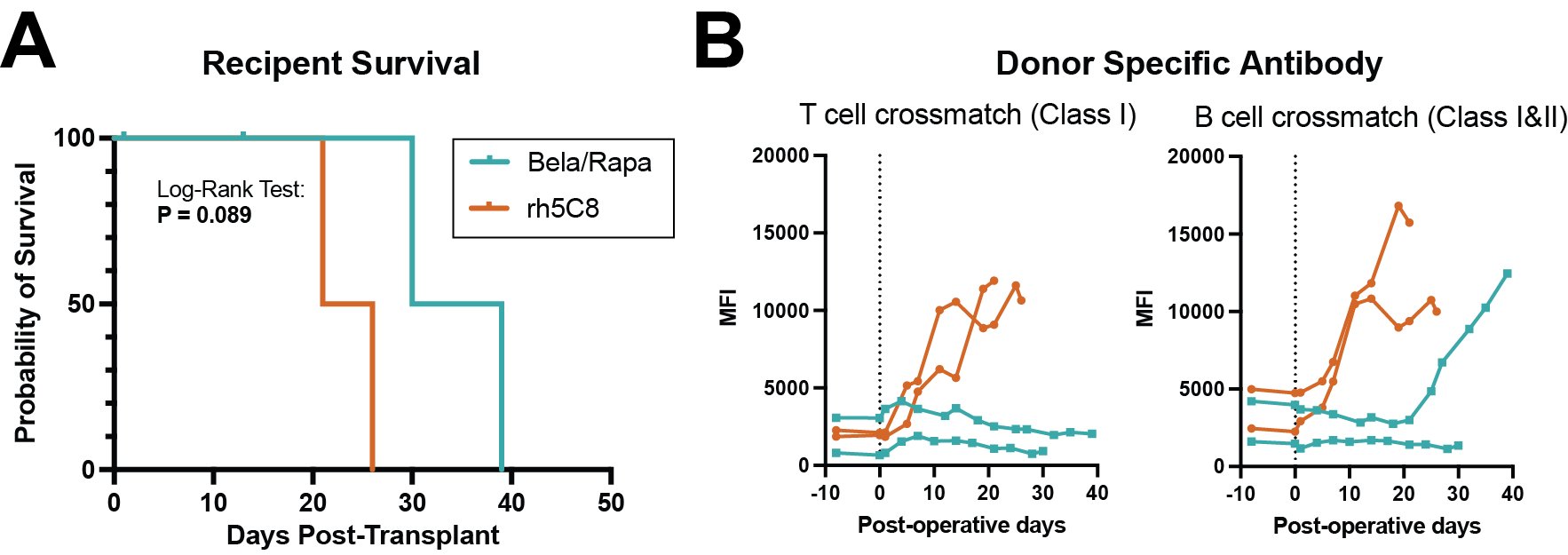Clinically Available Immunosuppressive Agents Prolong Pig-to-Primate Kidney Xenograft Survival
1Surgery, Duke Transplant Center, Durham, NC, 2eGenesis Inc, Cambridge, MA
Meeting: 2022 American Transplant Congress
Abstract number: 1532
Keywords: Antilymphocyte antibodies, Co-stimulation, Immunosuppression, Kidney transplantation
Topic: Basic Science » Basic Science » 13 - Xenotransplantation
Session Information
Session Time: 7:00pm-8:00pm
 Presentation Time: 7:00pm-8:00pm
Presentation Time: 7:00pm-8:00pm
Location: Hynes Halls C & D
*Purpose: Most immunosuppressive regimens used in Pig-To-Primate Xenotransplantation contain anti-CD154 agents, compounds that are currently not FDA-approved. The aim of this study was to assess whether a regimen made up of clinically available immunosuppressive agents prolonged xenograft survival.
*Methods: Cynomolgus macaques received life-sustaining kidney transplants from triple-knockout pigs with 7 additional human genes (provided by eGenesis; n=6). Animals received Thymoglobulin® as induction therapy and maintenance regimen consisted of either Belatacept/Rapamycin/MMF/Steroids (n=2) or anti-human CD154 mAb (5C8H1 clone)/MMF/Steroids (n=2). Two animals were excluded from post-transplant analysis due to technical complications.
*Results: All animals tolerated xeno-kidney transplantation well with no cases of hyperacute rejection. Animals treated with Belatacept/Rapamycin showed a trend towards prolonged graft survival compared to animals treated with anti-CD154 mAb (median survival time 35d vs. 24d, Figure 1A). One animal in the Belatacept/Rapamycin group developed class II pig-donor specific antibodies, while both animals in the anti-CD154 mAb developed both class I and class II pig-donor specific antibodies (Figure 1B).
*Conclusions: A regimen consisting of Thymoglobulin® /Belatacept/Rapamycin prolonged xenograft survival while preventing class I pig-donor specific antibodies formation. Surprisingly, both animals treated with anti-CD154 mAb developed class I and II pig-donor specific antibodies. Further studies are warranted to further characterize the efficacy of this clinically available regimen in xenotransplantation.
To cite this abstract in AMA style:
Anwar IJ, Gao Q, DeLaura I, Yoon J, Baldi R, Youd M, Stiede K, Hall K, Knechtle S, Kwun J. Clinically Available Immunosuppressive Agents Prolong Pig-to-Primate Kidney Xenograft Survival [abstract]. Am J Transplant. 2022; 22 (suppl 3). https://atcmeetingabstracts.com/abstract/clinically-available-immunosuppressive-agents-prolong-pig-to-primate-kidney-xenograft-survival/. Accessed February 19, 2026.« Back to 2022 American Transplant Congress

